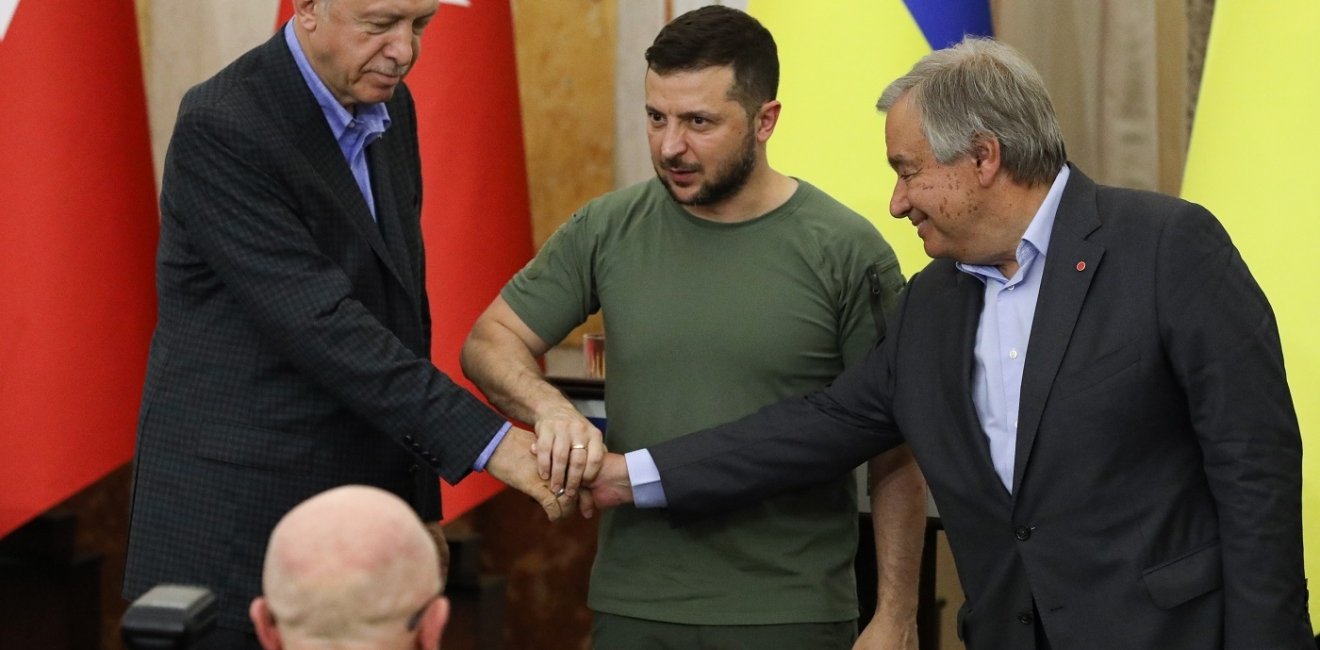
A blog of the Kennan Institute
The upcoming May general elections in Turkey could have a profound impact on Ukraine and its war with Russia. For over a year, beginning even before the start of the war, Turkey has played a rather sophisticated balancing act in Russia-Ukraine relations, publicly declaring its support for Ukraine while at the same time avoiding a direct clash with Moscow. By taking on the role of a key mediator between the two parties after February 24, Ankara has succeeded in maintaining relations with both Moscow and Kyiv and has directly benefited from such transactional neutrality in pursuing its key strategic objective: preserving and expanding Ankara’s regional and international influence. The upcoming elections are unlikely to produce a major policy shift, regardless of which party wins.
Ankara’s Pragmatic Foreign Policy
This cautious balancing act is the basis for Turkey’s foreign policy in the Ukraine-Russia-the West triangle. It was vital for the success of the 2022 grain deal, which allowed Ukrainian grain and corn to be exported from Ukraine’s Black Sea ports, further boosting Turkey’s image among wheat-dependent non-Western countries. Moreover, Ankara was able to exploit its neutral position to preserve trade and economic ties with Russia, allowing sanctioned goods to flow freely to and from Russia, prompting Washington to raise this issue in bilateral communications with Ankara in February 2023.
However, following the devastating February earthquake, which killed over 50,000 people and caused more than $100 billion in financial losses, President Recep Tayyip Erdoğan shifted his focus to domestic problems, sensing the need to maintain his reputation in the face of a united political opposition and a possible drop in poll standings, insofar as the affected regions are home to approximately 15 percent of his voters.
Turkey’s status as a mediator and Ankara’s Russia-Ukraine balancing act are clearly in Turkey’s national interest. Therefore, it is safe to assume that any political leader in Turkey would try to stick to the current strategy: maintaining the cautious balancing act between Russia, Ukraine, and the West; safeguarding existing trade, economic, logistical, and energy links; preserving Turkey’s role as a guarantor of the grain deal; and, through these efforts, carving out a key place in any postwar peace negotiations on Ukraine. What is more, an apparently weakened Russia is believed to be more susceptible to compromises and concessions in many fields of bilateral cooperation, including energy, agriculture, the South Caucasus, and Syria, to name a few.
Pressure on the Opposition to Pick a Side
In this context both Erdoğan and his primary contender, the leader of the Republican People’s Party (CHP), Kemal Kiliçdaroğlu, ought to be on the same page in their understanding of these interests and the geopolitical benefits Ankara stands to reap by pursuing them.
But just as in many other high-stakes, large-scale conflicts, neutrality is not something that is both understood and preferred by parties. No matter how lucrative and safe Erdoğan’s transactional approach to this war may be with respect to Turkey’s national interests, the Turkish opposition is under pressure from the public and the media (including Western media) to pick a side, join ranks with NATO, increase pressure on Moscow, and close all possible loopholes in US-led sanctions regime against Russia. Therefore, the main question of the upcoming elections is, will Turkey’s united opposition surrender to this pressure and break with Erdoğan’s policies, or will it make rather modest rhetorical changes while maintaining the role of a diplomatic intermediary in the Russia-Ukraine quagmire?
Kiliçdaroğlu’s position on Ukraine is not entirely clear. It seems that his team is focused on domestic issues and tries to avoid the topic of Ukraine so as not to make any unnecessary or hasty commitments in various statements. As a more traditional and moderate Kemalist, Kemal Kiliçdaroğlu is likely to tone down the anti-Western rhetoric coming from Ankara, resume talks on Ukraine’s EU membership, and strengthen ties with other NATO countries, while at the same time preserving the key pillars of the Erdoğan-driven pragmatic foreign policy.
Neither the CHP nor its primary partner, the Good Party, seem ready to abandon their economic and energy ties with Moscow and join Western-led sanctions, for example. At the same time, they are unlikely to support Russia in any way that could chill relationships with their Western allies, such as by opening the Turkish Straits and allowing more Russian military ships into the Black Sea.
Adding a bit of nuance, in one of his recent interviews, Kemal Kiliçdaroğlu hinted that under his leadership, Turkey would continue to cooperate with Russia on critical regional issues but would make this relationship less personalized and more institutionalized. His other possible partners in the opposition camp, the HDP alliance, a bloc of left-leaning pro-Kurd parties, has already stated that it is against abandoning Turkey’s neutrality in the Ukraine war.
No Major Surprises Expected
On the surface, it seems that whatever the result of the May elections may be, Turkey’s Ukraine policy is unlikely to undergo any major change. Certain deviations are possible in the public rhetoric (Erdoğan’s anti-Western stance versus Kiliçdaroğlu’s pro-NATO position), diplomatic contacts (Erdoğan’s personal diplomacy with Putin versus the opposition’s institutional, multifaceted approach), level of political cooperation (Erdoğan’s personal communication versus Kiliçdaroğlu’s institutional. mid-level approach), and probably the degree to which Turkey informally adheres to Western sanctions.
However, the possible policies of the Turkish opposition alliance are not well known and are hard to predict. The bloc comprises six different parties, whose respective leaders are to become vice-presidents should Kiliçdaroğlu win in May, according to their coalition agreements. Each of these leaders will add a personal touch to Turkey’s foreign and domestic policies, which still leaves some room for surprises, but probably not major ones.
The opinions expressed in this article are those solely of the author and do not reflect the views of the Kennan Institute.
Author


Kennan Institute
After more than 50 years as a vital part of the Wilson Center legacy, the Kennan Institute has become an independent think tank. You can find the current website for the Kennan Institute at kennaninstitute.org. Please look for future announcements about partnership activities between the Wilson Center and the Kennan Institute at Wilson Center Press Room. The Wilson Center is proud of its historic connection to the Kennan Institute and looks forward to supporting its activities as an independent center of knowledge. The Kennan Institute is committed to improving American understanding of Russia, Ukraine, Central Asia, the South Caucasus, and the surrounding region through research and exchange. Read more

Explore More in Focus Ukraine
Browse Focus Ukraine
Talking to the Dead to Heal the Living

Ukrainian Issue in Polish Elections


